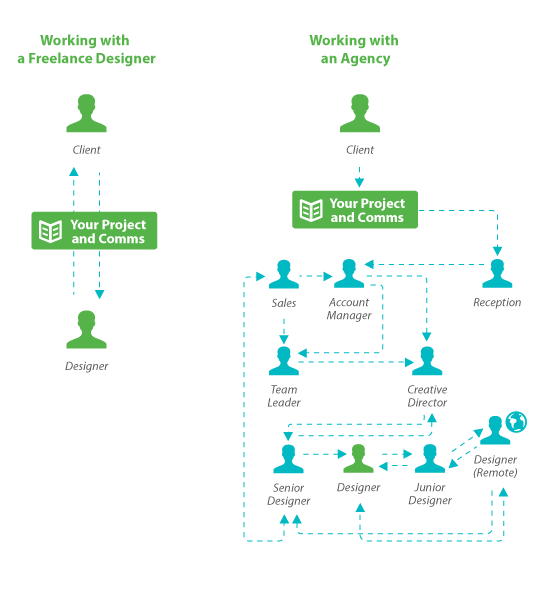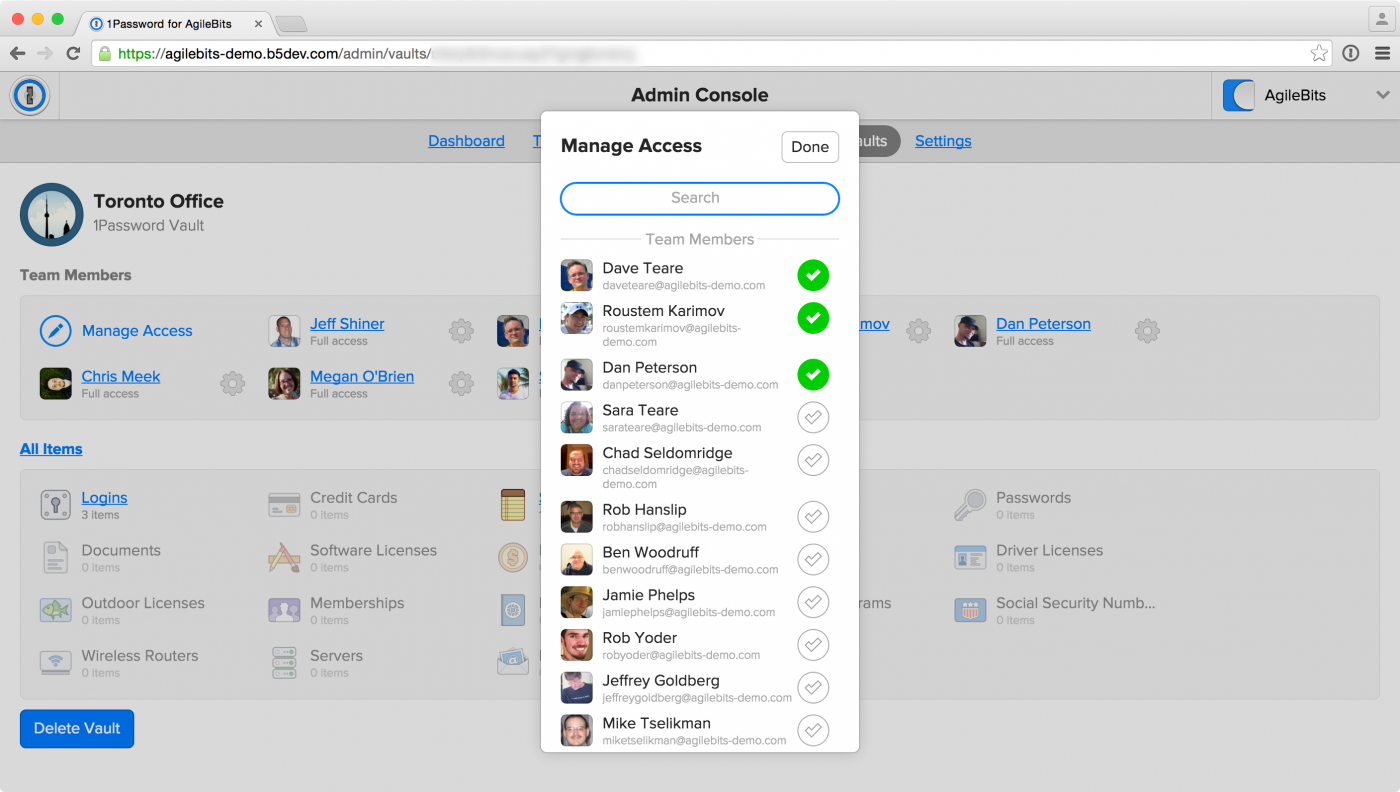

Literally - it’s just me and 3 plants in the office! This means 100% of your project is handled by me directly (I’ve yet to train my plants). I am 100% engaged, responsible and answerable on all the deliverables.
If you've worked with an Agency in the past you've probably dealt primarily with an Account Manager, Team Leader or Creative Director.
Somewhere within that setup is a designer and hopefully your requests trickle down to them. Hopefully, they survive the Chinese whispers too.
As much as I’d love to have space for a dedicated Project Manager, Account Manager and Team Leader, I know something essential would be lost. Clients who have hired an Agency in the past agree that projects and comms can suffer.

On the other hand, working with a freelancer means you get to speak directly with the designer working on your project. It’s just one of the reasons I work solo - that direct communication leads to better ideas from both sides. Clients love knowing who is working on their project at any one time (me!).
It should be the norm but anecdotal evidence tells me it's rare. The reality is they’re dealing with several layers of company structure.
Communications and project ping-pong are a waste of everyone's time. If you've ever had a phone call like the script below then you'll recognise project ping-pong.
Receptionist: Hi, Crazy Agency Inc. speaking. How may I help?
Client: Hi - this is John from Global Client Corp. Can I speak with Elaine about Project X?
Receptionist: Oh - Elaine has left the company. Let me put you through to Garry who now handles account management.
Phil: Hi John. This is Phil. Garry is actually out today. Can I help or pass you through to team B?
Client: Can I speak with a designer about my project?
Phil: Em, who were you dealing with? I’m not familiar with that project and I think the creative director is on leave.
etc...
Ok, I’m being a little creative here but it's not far from what can happen.
Join us tomorrow for part 2 of 16.
I pay for and organise my own training and professional development. This isn't simply because it’s the 'thing to do' - like most freelancers I’m curious by nature.
Working in an industry which constantly changes means this curiosity gets plenty of mileage. I'm always looking to attend the next course, read the next book or enroll in web-based training.
Great freelancers also love helping clients solve problems - it’s a hugely rewarding part of the job. So when a client comes to us and we can’t solve that problem, we find it frustrating - but we’re motivated to figure it out and acquire new skills along the way. It's a pretty neat circle.
It’s that curiosity too, which brings freelancers to a broad range of disciplines related to their core field(s) of expertise.
E.g. While I originally trained as a graphic designer, I subsequently branched into web & digital work. I’m also interested in:
When commissioned to design a website, a great freelancer understands how layouts and content may affect search engine rankings.
When working with blog content, an experienced freelancer can help you understand how it can integrate with social media.
When optimising your website for conversions, a freelancer might have insights into content marketing.
You may hire a freelancer for a specific task, but you will inevitably benefit by working with someone who can see the bigger picture and how it all fits together.
Join us tomorrow for part 3 of 16.
Next time you’re speaking to an Agency, ask them how long their designer(s) have been with the company.
One of the challenges for Agencies is finding good staff. More challenging than finding talent is holding onto it.
Our father’s generation may have considered a job for life. Some designers I know are on jobs boards every month.
And this isn’t because they’re mercenary, disloyal or even unfulfilled at work. Good designers are very much in demand.
It’s a hugely exciting and growing industry and there are a wealth of opportunities available to them. They will actively pursue them.
To paint a real-world example, let me get all provincial for a moment and talk about my hometown of Dublin.
In Dublin, we have
to name just a few.
That’s a pretty substantial list of industry heavyweights. They’re also expanding and hiring. They’re dangling carrots on front of Agency staff.
Having friends in such roles, I’m informed the perks often include
Not only are the benefits amazing (hey, why exactly AM i still freelance? ) but these companies can also afford great recruitment companies. - companies tasked with dismantling your Agencies team.
And it does happen. I know for a fact that churn rates of talented staff in Agencies are exceptionally high. Often your project can be worked on by several different people in quick succession - each replacing the previous designer.
Frequently, key projects are passed to interns or junior designers without the client’s awareness.
And it’s not just the Web 2.0 companies with massive funding and salaries that can cause a line up change at an Agency. Pretty much all of the full time PAYE designer and developers I know are at any one position for a max of 1.5 to 3 years.
On the other hand, a freelancer chooses to work for themselves. We make our own perks. Pensions, leave and salaries might be important to us but the biggest perks we create ourselves. IE having the opportunity to deliver great work to clients we love working with.
By working with a freelancer, you’re working with someone who “does this for a living”. It’s their job, their life, their 9-5 and most times their 7-9.
They’re not going to disappear and start working at HotSocialCo.com tomorrow. Freelancing is who they are - it’s in their blood. So, work with a freelancer because they’ll still be there tomorrow.

We’ve all been involved in projects that have deadlines unexpectedly brought forward or increased in scope.
When this happens, hiring full time staff and sourcing office and desk space isn’t always practical. Then there’s payrolls, pensions and contracts to consider too.
By hiring a freelance designer/developer you can rapidly spin up a team's capability to meet demand.
Better still, when a project is complete you can return the team to its normal operational size. No long-term commitment is required to work with a freelancer and you can avoid breaching contractual obligations which can come with permanent staff.
Additionally, freelancers are often flexible in terms of location. We can travel, work remotely or work onsite in ways a full or part-time staff member may not be prepared for.

I’m always amazed at the backlog of tiny things which clients build up in relation to their website or digital collateral.
These relatively simple tasks can occupy a to-do list for months and are often bumped in preference of more urgent or larger projects.
I guess it’s like having a squeaky hinge or a dripping tap. These things hang around and niggle at you that they need attention. Once completed there’s often a disproportionate sense of relief that they’re done. Onto the next task!
One of my client’s recently described the completion of one of these tasks as an “huge relief” and something that he's 'been meaning to zap months ago'.
The problem for him was an Agency would need
before they'd even consider the work.
The actual task took me about 2 hours in the end and yet it had bugged him for months.
I call these tasks ‘micro projects’. They’re the 25 little projects you want to do that you just couldn’t get an Agency out of bed for.
Here’s a quick list of things client’s have requested looking at over the past few months
All in all, relatively straightforward mini projects.
You won't get an agency to do them but given a few hours on a Friday or weekend, I’m perfectly happy tackling them with some music on and a cup of tea!
What are the 25 mini projects bugging you at the moment? Have you thought about hiring a freelancer to make them disappear?
We realise things can change quickly for clients. When this happens, you need flexibility from your freelancers.
Generally speaking, we have projects booked in and planned well in advance. It's how we like to do things and it ensures deadlines are met etc. But we also realise things can change quickly for clients.
As someone managing my own projects, I get to be flexible with our project stack and decide what is being worked on right now.
If your project expands in scope or requires extra time and resources, I can generally accommodate that. Likewise, when a deadline needs to be brought forward, a good freelancer can quickly adapt to that too.
We don’t like it to be the norm (that’s what processes and planning are for), but when it does happen, a good freelancer can adjust.
Get up early, stay up late, start Project X at the weekend or park Project B for a few days. We’re good at it.
On the other hand, an Agency can be a like a large bus. It’s doesn’t like abrupt stops or sudden changes in direction. You set it on a course and it’s on it’s way. There are 15 individuals onboard that need to be consulted before unscheduled detours are made!
We get to green light projects we are interested in.
As a busy freelancer designer, I’m in a position to pick the projects I work on. It wasn’t always that way - starting out self-employed means you take any job you can. But 16 years later I’m lucky enough to choose what I work on and this has a fundamental benefit to clients we work with.
It means every project getting the green light is something we’ve committed to.
IE We've taken it on because
I think freelancers and independent consultants owe it to clients to only accept work they feel can be done and done well.
It may sound remarkably obvious and yet as a 9-5 employee of an Agency the opposite is often true. IE your project manager decides what you work on.
So regardless of that designers level of interest in a project, their suitability to the task or their affinity or understanding of the industry, it’s on their desk.
I don’t think that’s right IE that people with no interest in your project are producing it.
By working with a busy freelancer you benefit not because they need the work but because they chose the work.
We make our living from the quality of our work and our reputation so we're motivated to always produce great work for clients we work well with.
One of the holdups I often encouter when starting a project is acquiring login details. Wether it's server details or access to a shared folder, traditionally it's a slow process getting access from various client departments.
Understandably, IT have to be careful about distributing sensitive data. They also have to consider how we ourselves are storing login details.
Thankfully, this is one aspect of project life that is changing quickly as modern cloud-based services have user-management and collaboration tools built in.
Our clients share data with us across a range of tools such as:
Providing access is not only easier but so is managing access. IE When a service provider has completed a project, a client can easily suspend access.
In short, sharing data is simpler and more secure than its ever been. Clients wishing to work with a freelancer have a huge range of services and platforms to facilitate data sharing and kick off projects more easily.

Using Slack for managing team comm? Great - we know it.
Using Basecamp for managing projects? Fine - we can use that.
Want to use JitBit for managing your HelpDesk? No problem - we can use that too.
That’s because the best freelancers are agile. We can adapt to your workflow and we’re familiar with a wide range of platforms which may be crucial to your projects.
Find a good freelancer and you’ve found an additional to your team that can work how you already work.
Aoife 10 years ago
Great post, look forward to reading the next ones.
Agree re the benefits of speaking directly to the designer.
Also even when I work freelance on accounts via agencies, everyone in the agency eventually moves on, leaving myself and the client as the only constants... they're not going anywhere and neither am I ;-)
Freelancers FTW! :-)
Peter Knight 10 years ago
Thanks Aoife.
So true. That's post number #7 according to my Google Doc :)
Chris M 10 years ago
Nice post re. scalability and freelancers. We have a core team in the London office as we get established there. Having a pool of high-end freelancers in place means we can pitch for larger contracts and punch above our weight in a new market.